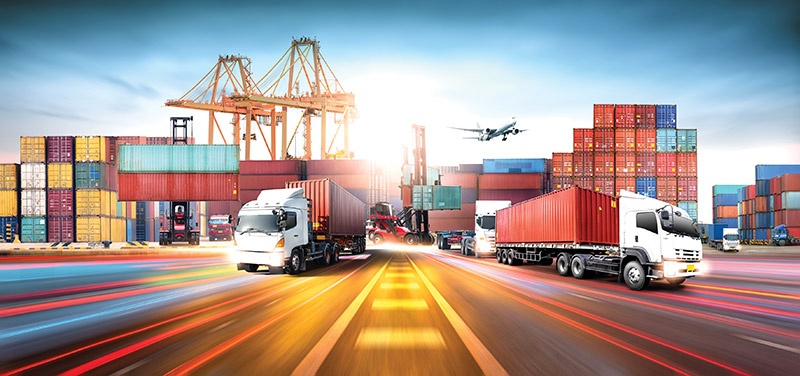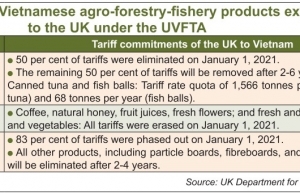Transition period sets path for UK export prospects
Nguyen Canh Cuong, trade counsellor at the Vietnamese Embassy to the United Kingdom, told VIR that from January 1, 2023, all Vietnamese exporters of industrial goods to Great Britain will have to have the UK Conformity Assessed (UKCA) marking on their products instead of the EU’s Conformité Européenne (CE) mark, which requires the manufacturer or importer to affirms the goods’ conformity with European health, safety, and environmental protection standards.
“The UKCA is important to those who are exporting manufactured products to the UK and to those who are in charge of the manufacturing industry as well as of exporting its products in competent authorities,” Cuong said. “You have to get the CE mark on your products if you want to export your products to markets of the EU member states.”
Cuong noted that the CE mark is still accepted in the UK, but will not be for long because the UK government has decided to implement its own regulation on conformity. “Can you discard this new regulation? No, simply because you don’t want to lose this big market.”
 |
| Transition period sets path for UK export prospects-illustration photo |
The UK government stated on its website that the UKCA is a new British product marking that is used for goods being placed on the market from England, Wales, and Scotland. It applies to most goods previously subject to the CE marking. The UKCA marking alone cannot be used for goods placed on the Northern Ireland market, due to its unique position of being the only UK nation with a land border with the EU.
The UKCA marking came into effect on January 2021. However, to allow businesses time to adjust to the new requirements, a transitional period is now taking place for products with the CE marking until January 1, 2023 in most cases. “The essential requirements you must meet are largely the same as they were for the CE marking,” said the UK government. “The circumstances in which you can use self-declaration of conformity for the UKCA marking are the same as for the CE marking.”
According to the UK’s Office for National Statistics, total goods imports into the UK in 2021 reached £465.5 billion ($562 billion), an increase of £36.0 billion ($44 billion) or 8.4 per cent compared to 2020.
Total imports of goods, excluding precious metals, into the UK in the first five months of 2022 reached £205.3 billion ($248 billion). In which, imports from the EU hit £104.1 billion ($125.8 billion) – with imports of production materials, machinery and equipment, and means of transport accounting for 59.2 per cent, and imports from non-EU countries sat at £101.2 billion ($122.3 billion) in which 47 per cent were production materials, machinery, equipment, and means of transport.
“Vietnam is an important trading partner with the UK, ranking 23rd in the list of top exporting countries to the UK in the past two years,” said Ta Hoang Linh, general director of the Ministry of Industry and Trade’s (MoIT) Department of European and American Markets.
At a seminar on the topic organised by the Vietnamese Embassy to the UK over a week ago, Linh reported that the export turnover of industrial goods (excluding iron, steel, and metals) from Vietnam to the UK in 2021 hit $2.54 billion, accounting for 44.2 per cent of the total export value, with phones and components (24 per cent); machinery, equipment, tools, and spare parts (10.8 per cent); iron and steel (8.7 per cent); and computers, electronic products, and components (5.6 per cent).
“These statistics show that the export of industrial products of Vietnam plays a large and important role in the total value of Vietnam’s exports to the UK,” Linh said. “This also means the UKCA mark is a mandatory requirement for most industrial products traded and used in the UK from January 1, 2023. Therefore, the guidance of Vietnamese enterprises on UKCA is practical and needs to be implemented immediately.”
In the first six months of 2022, trade turnover between Vietnam and the UK reached $3.3 billion, only down slightly 0.2 per cent on-year. Vietnam’s exports to the UK hit $2.9 billion, up 1.2 per cent, while imports from the UK stood at $372.5 million, down 9.9 per cent.
Last year the total bilateral trade turnover hit over $6.6 billion, up 17.2 per cent compared to 2020. Of which, Vietnam’s export turnover to the UK stood at over $5.76 billion, up 16.4 per cent.
According to the MoIT’s Department of European and American Markets, despite the numerous advantages and opportunities of the UK-Vietnam Free Trade Agreement, there are certain difficulties affecting bilateral trade including non-tariff technical barriers in the UK.
“The British market has high and strict import standards,” Linh explained. “The fact that Brexit comes with some changes to some regulations and procedures for goods and services imported into the UK - and switching from the CE to the UKCA is an example - is forcing firms to learn, update, and apply new procedures to maintain trade with Britain.”
Linh confirmed that some Vietnamese companies producing personal protective equipment or construction materials have succeeded in applying the UKCA for their products. Companies with the desired demand can proactively contact some UKCA consulting and licensing agencies in Vietnam, such as the British Standards Institution, for their support to apply the new standard to their manufacturing products.
 | Britain ripe for new business with Vietnamese agro imports Vietnam and the United Kingdom are expanding their agricultural ties, with a bilateral trade deal acting as strong leverage under fresh commitments. |
 | UK ramps up Global Britain agenda with new dialogues As the United Kingdom is further cementing its cooperation with ASEAN in various sectors including trade and investment, this nation is deepening the similar ties with Vietnam on the back of a bilateral trade agreement and an upcoming $11 trillion Asia-Pacific free trade deal. |
What the stars mean:
★ Poor ★ ★ Promising ★★★ Good ★★★★ Very good ★★★★★ Exceptional
Related Contents
Latest News
More News
- Kurz Vietnam expands Gia Lai factory (February 27, 2026 | 16:37)
- SK Innovation-led consortium wins $2.3 billion LNG project in Nghe An (February 25, 2026 | 07:56)
- THACO opens $70 million manufacturing complex in Danang (February 25, 2026 | 07:54)
- Phu Quoc International Airport expansion approved to meet rising demand (February 24, 2026 | 10:00)
- Bac Giang International Logistics Centre faces land clearance barrier (February 24, 2026 | 08:00)
- Bright prospects abound in European investment (February 19, 2026 | 20:27)
- Internal strengths attest to commitment to progress (February 19, 2026 | 20:13)
- Vietnam, New Zealand seek level-up in ties (February 19, 2026 | 18:06)
- Untapped potential in relations with Indonesia (February 19, 2026 | 17:56)
- German strengths match Vietnamese aspirations (February 19, 2026 | 17:40)

 Tag:
Tag:




















 Mobile Version
Mobile Version